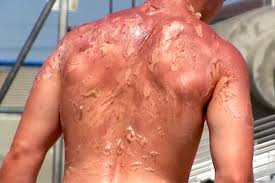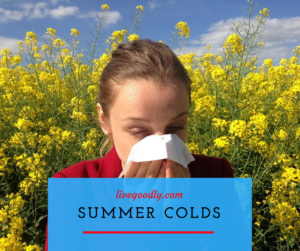We normally associate illness with winter, mainly because it’s the time of year we tend to get colds and flu.
However, there is no shortage of ailments and conditions that make life unpleasant and spoil our fun during the summer months.
The following are examples of health issues associated with summer:
1. Food poisoning
According to the CDC (Center for Disease Prevention and Control), every year around 3,000 Americans die from foodborne diseases.
Warm weather encourages bacteria to multiply, and who doesn’t enjoy barbeques and picnics during summer? Food that is prepared in advance and allowed to stand in the heat creates the perfect conditions for contamination and food poisoning.
Pre-prepared food should be handled hygienically, stored safely and kept cool if possible. It’s also better to choose foods that don’t spoil as easily or can be freshly prepared at your destination.
NHS Choices explains that most cases of food poisoning can be treated at home and do not require medical advice, and that most people will feel better in a matter of days. It is however important to replace fluids lost through vomiting and diarrhea.
If symptoms are severe, you may need to be admitted to hospital for a few days and given intravenous hydration.
2. Heat rash
Heat rash is a red or pink rash usually found on areas of the body that are covered with clothing. It happens during hot humid conditions and is most common in children. Heat rash develops when sweat ducts become blocked and swell up, looking like dots or tiny pimples on the skin. It often causes discomfort and itching.
Heat rash usually heals on its own in a matter of days and doesn’t require medical attention. In some cases the rash gets infected with symptoms like pain, swelling and pus. If this happens, be sure to see your doctor.
3. Water-borne conditions
We all like to spend time in the water during summer, and Dennis Maki, a professor of infectious diseases at the University of Wisconsin School of Medicine and Public Health, warns of the risk of bacterial infections and other water-borne illnesses as a result of taking part in recreational water activities.
Germs that turn up in swimming pool water include bacteria like E. coli, Salmonella, Camplobacter, noroviruses, and parasites. While treatment with chlorine can kill germs in swimming pools, it takes time for the chlorine to do its job.
Crypto is the most common cause of diarrhea outbreaks linked with swimming pools or water parks because it can survive up to 10 days in chlorinated water. … Infections can cause watery diarrhea, stomach cramps, nausea or vomiting, and can lead to dehydration. CDC states “Crypto is highly resistant to chlorine, which makes it hard to kill once it’s in the water. Swallowing just a mouthful of water with crypto in it can make otherwise healthy kids and adults sick for weeks with watery diarrhea, stomach cramps , nausea, and vomiting,” says Michele Hlavsa, chief of the CDC’s Healthy Swimming Program. Every year, at least 15 to 20 outbreaks of diseases, like stomach bugs and diarrhea, are linked to swimming in public pools, according to the CDC.”
“Here are some tips from CDC in helping to protect you and your kids when the temperatures rise and the public pool is the only thing that will cool the heatwave:
- Don’t swim or let your kids swim if sick with diarrhea.
- Check the pool, hot tub, and water playground inspection scores.
- Use test strips to check the water’s pH and chlorine levels. You can get free test kits from the website of the Water Quality & Health Council.
- Try not to swallow the water.
- Take small children on frequent bathroom breaks.
- Shower before getting into a pool.
- Listen for the sound of a working pool pump.
- Change diapers in a diaper-changing area and away from the water.”
Apart from natural bodies of water like rivers and lakes, pools and hot tubs can also be sources of gastrointestinal problems; skin, ear and eye infections; and respiratory, neurological and viral problems. The safest places to swim are pools that are regularly checked for their chlorine levels.
4. Summer colds (summer or winter cold the symptoms are the same).
There is a kind of virus that produces cold-like symptoms, which tends to rear its ugly head during the summer months. It is called enterovirus and can cause more complicated symptoms than the typical winter cold.
Something summery may be lingering even as the season fades—the summer cold.
Colds in summertime can last for weeks, at times seemingly going away and then suddenly storming back with a vengeance, infectious-disease experts say. A winter cold, by contrast, is typically gone in a few days.
The reason for the difference: Summer colds are caused by different viruses from the ones that bring on sniffling and sneezing in the colder months. And some of the things people commonly do in the summer can prolong the illness, like being physically active and going in and out of air-conditioned buildings.
“A winter cold is nasty, brutish and short,” says Bruce Hirsch, infectious-disease specialist at North Shore University Hospital in Manhasset, N.Y. “But summer colds tend to linger. They can go on for weeks and reoccur.”
Summer colds, which can hit between June and October, occur only about 25% as often as the winter variety. But summer colds can have more severe, flu-like symptoms, in addition to sneezing and coughing. Many people also mistake a summer cold for allergies, because it just doesn’t seem to leave.
According to Merck Manual, symptoms of a summer cold caused by enterovirus include fever, headache, and sore throat, and sometimes mouth sores or a rash. Treatment is basically aimed at relieving symptoms.
5. Headache
An unfortunate result of summer activities that involve spending a lot of time in the hot sun can be a spitting headache. A survey by the National Headache Foundation indicates that headache sufferers consider summer to be the worst time of year for headaches.
As the temperature goes up, so does your risk for getting a headache. One theory is that the heat makes blood vessels in your head expand, causing them to press against nerve endings. Dehydration and strenuous exercise in hot weather can also lead to headaches.
An over-the-counter painkiller will usually alleviate headaches caused by heat exposure and exercise, and drinking enough water should take care of a dehydration headache.
6. Heat stroke
Heat stroke or hyperthermia results from prolonged exposure to high temperatures. It can happen for example when children are left in hot cars during summer.
Emedicinehealth defines heat stroke as a condition where the body’s cooling mechanisms are overcome by heat, resulting in a core heat of over 40°C. Heat stroke is preceded by signs of heat exhaustion like headaches, dizziness and weakness, and results in unconsciousness, organ failure and eventually death.
Hyperthermia is primarily treated by outside cooling of the body with the help of water, cold air or ice packs. Internal cooling by flushing the stomach or rectum with cold may also be used. Persons with hyperthermia need to be hospitalised in order to be tested for complications like muscle breakdown, which can damage the kidneys.
7. Sunburn
With summer comes the danger of sunburn, which can be extremely serious. Sunburn is caused by ultraviolet (UV) rays from the sun that damage your skin cells. The risk of damage depends on things like the time of day, the amount of time spent in the sun and if you use sun protection or not.
Sunburn can lead to long-term skin damage and even skin cancer. MedicineNet.com explains that there are three major kinds of skin cancer:
- Basal cell carcinoma (most common type)
- Squamous cell carcinoma (second most common)
- Melanoma (less common but considerably more dangerous)
The best and simplest way to avoid sunburn is to stay out of the sun. Other ways to be sun-safe is to stay out of the midday sun, stay in the shade, use a good sunscreen and wear a hat and protective clothing.


